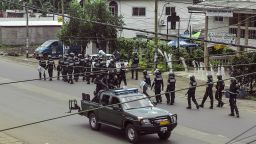Story highlights
Protesters in English-speaking regions are clashing with government forces
Streets in those areas are heavily militarized, a resident says
Fear and uncertainty reign in Cameroon’s Northwest and Southwest regions following a week of violent clashes between protesters and government forces that have left at least 10 people dead.
The office of the United Nations high commissioner for human rights urged the two sides to engage in dialogue and called on the Cameroonian authorities to exercise restraint when policing demonstrations in the two English-speaking regions.
“Credible sources indicate that some of these deaths resulted from excessive use of force by the security forces,” said Rupert Colville, a spokesman for the high commissioner’s office. “People should be allowed to exercise their right to peaceful assembly and freedom of expression, including through having uninterrupted access to the Internet.”
Tensions boiled over October 1 when protesters took to the streets in Cameroon’s Anglophone regions calling for symbolic independence from the country’s French-speaking majority.
Multiple protests have taken place since last year, as English-speakers feel growing discrimination by the mostly Francophone government. Though both French and English are the official languages, English-speaking lawyers and teachers are protesting that they have to use only French as the official language.

Violence reaches ‘crisis point’
“The worrying escalation witnessed over the weekend has now reached a crisis point,” said Ilaria Allegrozzi, a researcher with Amnesty International.
“We have denounced the use of excessive force by the security forces using both tear gas and live ammunitions,” she said.
The government has confirmed 10 deaths, but Allegrozzi said the number could be more than 20. Some activists say the death toll could be even higher as communications and social media are restricted.
Allegrozzi said dozens of people have suffered gunshot injuries and hundreds have been arrested, often arbitrarily.
She said Amnesty has received testimonies about allegations that government forces fired on protesters from helicopters during Sunday’s demonstrations, and the organization is trying to verify those claims.
Cameroon army spokesman Col. Didier Badjeck has rejected the allegations.
‘We are living in fear’
Residents told CNN the situation is getting worse by the day as security forces have been breaking into homes and beating and arresting boys whom they suspect of taking part in the protests.

In villages such as Tombel, Ekiliwidi, Eyumojock, Ekona and Muea many people have fled to forests after security forces entered those areas harassing the population.
The streets of Anglophone Cameroon are still heavily militarized, one Kumba resident told CNN on Saturday. Soldiers and police are visible on street corners with guns, tear gas and water cannons. ”We are living in fear,” said the resident.
CNN has not been able to independently verify those claims.
“In order to avoid further bloodshed, the security forces must cease unnecessary and excessive use of force, and protesters should be peaceful if they want to make their voices heard,” Amnesty said in a statement, calling on the government to investigate the killings.
President Paul Biya has condemned “all acts of violence, regardless of their sources and their perpetrators,” although some see the actions of the security forces as a way to secure his 35-year grip on power.

